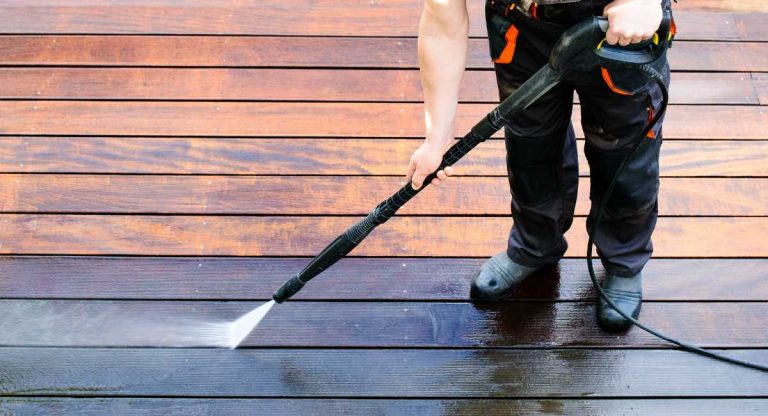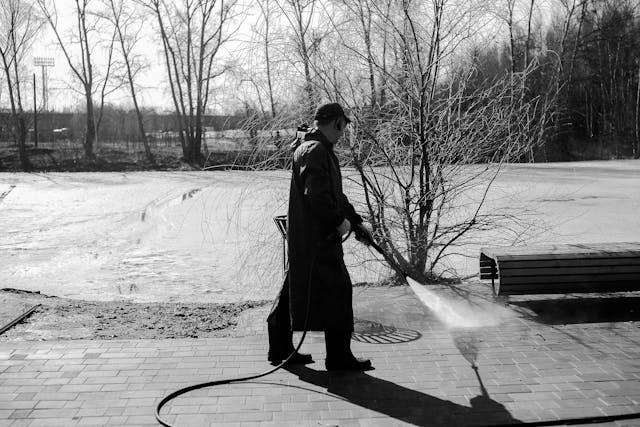
Hiring a power washing service might seem like a straightforward decision — call someone, get a quote, schedule the job. But there’s one critical step that many homeowners overlook: verifying the company’s insurance and licensing. 🧾💡
Skipping this step can expose you to major financial and legal risks, from property damage to liability for injuries. So before you let anyone start spraying high-pressure water around your siding, roof, or patio, here’s how to do your due diligence like a pro. 🧼🏡
🤔 Why Does Insurance and Licensing Matter?
Imagine this: a technician slips on your driveway and fractures their wrist. Or worse — they damage your siding or blow out a window. Without the proper insurance and licensing, you could be left footing the bill. 😱
Here’s why you should care:
- Licensing shows they’re a legitimate business that meets local/state standards
- Liability insurance covers damage to your property
- Workers’ compensation covers injuries to employees on your property
No insurance = big risk. And unfortunately, during busy seasons, some fly-by-night operations cut corners.
📋 Step-by-Step: How to Verify Their Credentials
✅ Step 1: Ask Directly (and Early)
When you first speak to a power washing company, ask:
“Are you licensed and insured? Can you send me proof?”
Any reputable contractor will expect this question — and should have their documents ready to send via email or text. 📧
If they hesitate, give vague answers, or try to brush it off, that’s your red flag. 🚩
✅ Step 2: Review the Insurance Certificate
Ask for a Certificate of Insurance (COI), which should include:
- The company’s name and address
- The name of their insurance provider
- Types of coverage (General Liability, Workers’ Comp, etc.)
- Coverage limits
- Expiration date
- Your name/address as the certificate holder (if requested)
🧠 Tip: The policy should show at least $1 million in liability coverage. Anything less is risky.
Also check the expiration date — expired policies mean zero protection.
✅ Step 3: Check Their Licensing (State or Local)
Power washing may be regulated differently depending on your location. In some states, it falls under a general contractor license; in others, it might require a specialty business permit. 🔍
Here’s how to check:
- State licensing board websites (search “[your state] contractor license lookup”)
- Local municipality websites for business license databases
- Ask for their license number and verify it yourself online
📞 If needed, you can call your local building department for clarification.
✅ Step 4: Confirm They’re Registered to Do Business
You can check if a company is registered by searching your state’s Secretary of State website. Just type in the business name. This ensures:
- The business is officially recognized
- It’s in good standing
- You can verify the owner/operator
This step adds an extra layer of legitimacy, especially for newer or smaller companies.
🧠 What Types of Insurance Should They Have?
Let’s break down the key types:
🛠️ 1. General Liability Insurance
Covers:
- Damage to your property
- Broken windows, destroyed landscaping, etc.
Make sure it’s active and covers residential work.
👷♂️ 2. Workers’ Compensation Insurance
Covers:
- Injuries sustained by workers while on your property
- Medical costs, wage replacement, etc.
Why it matters: If a tech falls off a ladder at your house, and their company doesn’t have workers’ comp, you could be held liable.
🚚 3. Commercial Auto Insurance
If the company drives work trucks to your property, they should have this. It’s a bonus layer of protection.
🧼 Questions to Ask Before Hiring
Here are some smart questions to keep in your back pocket:
- “Do you have general liability and workers’ comp insurance?”
- “Can you email me your insurance certificate and license info?”
- “Is your business registered with the state?”
- “What happens if there’s accidental damage — how is that handled?”
- “Who exactly will be doing the work — employees or subcontractors?”
If they dodge these questions, move on. Plenty of insured pros are out there. ✅
💬 What If They’re a Solo Operator?
Solo operators (one-person businesses) are common in the power washing industry. Many are reputable and properly insured. However, some skip insurance to save money.
If a solo operator can’t provide:
- Proof of liability insurance
- Proof of licensing (if required)
…you should think twice. Even if they’re great at what they do, you have zero protection if things go wrong.
💵 Are Insured Companies More Expensive?
Sometimes. But think of it like this:
- 💸 Uninsured service: $150
- 🔐 Insured service: $250
If something gets damaged or someone is injured, the extra $100 is worth thousands in peace of mind.
Protecting your home isn’t a place to cut corners. Ever.
🏁 Final Thoughts
Verifying a power washing service’s insurance and licensing takes just a few minutes, but it can save you from expensive headaches and legal drama. Whether it’s a quick driveway rinse or a full exterior wash, make sure you’re protected. 🔒
Ask for documentation, double-check what they send, and don’t be afraid to walk away if something feels off. A clean home shouldn’t come with dirty risks. 🧼🏠✨
Browse Amazon Here For Top Rated Power Washers And Accessories






